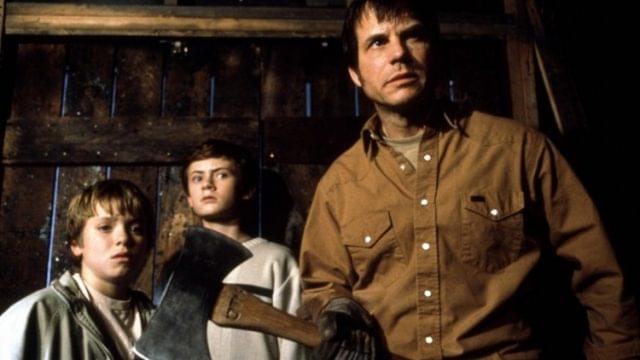
“Frailty” is a disturbing and deeply flawed movie that, despite its faults, I cannot stop thinking about. It gets by on the power of its ideas, rather than on their often-weak execution.
Those ideas, though, are enough to keep you creeped out for a month.
“Frailty” begins in the Dallas FBI office, where a man identifying himself as Fenton Meiks (Matthew McConaughey) tells Agent Wesley Doyle (Powers Boothe) that he knows the identity of a serial killer responsible for six murders: It is his brother, Adam (Levi Kreis).
Fenton tells Doyle the story, which we see in flashback. When Fenton and Adam were young, their father (Bill Paxton, who also directed) claimed to have visions from God instructing him to find certain “demons” — who look like regular people to you and me — and “destroy” them — which looks like killing them with an ax to you and me. God gave him a list of names, and Dad began his righteous work. He involved his sons in every aspect of it, encouraging them to have the necessary faith to see the same visions he had.
Young Fenton (Matt O’Leary) believes his father is insane, but lacks the gumption to turn him in. Aside from the killing, he’s a good father, and who’s to say God ISN’T speaking to him? Young Adam (Jeremy Sumpter), meanwhile, is wide-eyed and faithful, and is only disappointed at not being privy to the same sort of manifestations as his father. Now, it would seem, he is continuing Dad’s life’s work.
Hearing it described, or even reading some of the script, you could mistake this for a dark comedy. The ideas are that extreme. But it is deathly serious work, and it’s an impressive directorial debut for the actor Bill Paxton. The atmosphere is creepy and horrific, and the idea of children being witness to such dreadful murders will stick with you long after the film is over.
But what does it add up to? Religious fervor can cause people to do unbelievable things, yes, but that idea is not developed beyond the summary I just gave you. The script, by first-time writer Brent Hanley, stumbles in the final act — in real life, cops always call for back-up — and the twists become easy to predict. One of those turns is an outright cheat, as we learn a character has lied only to mess with OUR minds, and not the mind of the person he lied to. Movie characters shouldn’t do things for the audience’s benefit; they should do them because they are appropriate for the fictional situation they are in.
Mr. Meiks says that when he touches the demons, he can see their sins. This concept was just used in 2000’s “Unbreakable,” which I’m hesitant to complain about — except that “Frailty” uses a surprise twist that is almost identical to the one in that film. (It was more believable in “Unbreakable,” by the way; in “Frailty,” it is awkwardy set up and badly realized.)
So there are problems with the movie … and yet, here I am, continuing to think deeply about it. Its method of storytelling is so straightforward, so awash with campfire-story eeriness, that it comes across as far less outrageous than it should. You believe what’s going on, even as you’re shaking your head in disbelief that a movie is actually daring enough to suggest such a thing. It may take a second viewing to fully appreciate the not-just-a-horror-flick subtleties of it — but who really wants another run-through of kids learning how to murder at their father’s knee?
B (; )





